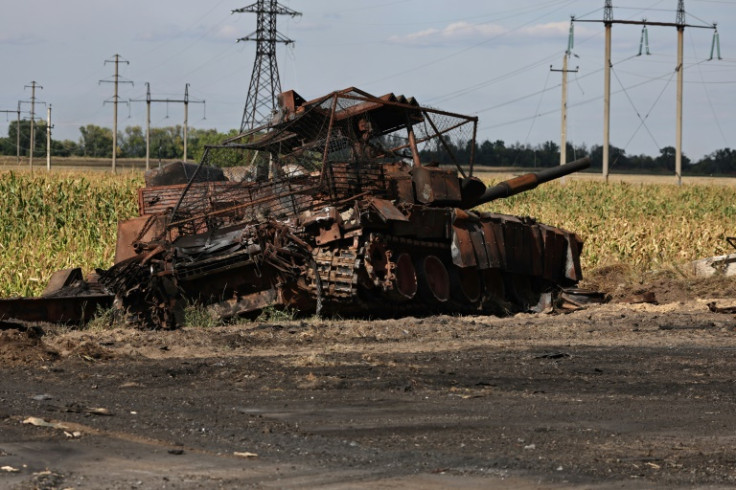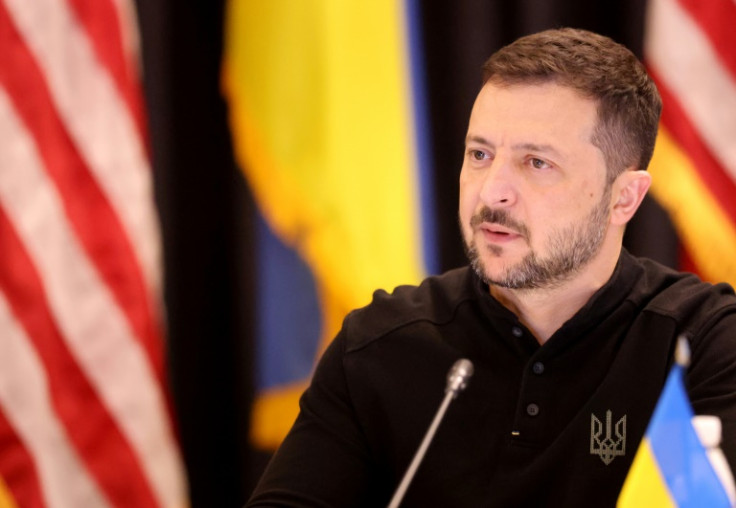
President Volodymyr Zelensky joined a meeting of Ukraine's international backers in Germany on Friday, appealing for additional weapons as Kyiv faces advancing Russian forces in the east and devastating strikes by Moscow.
He was also due to meet German Chancellor Olaf Scholz and then head to Italy, following the meeting at Ramstein Air Base, which comes days after 55 people were killed and 300 wounded in a Russian missile strike on the city of Poltava.
"We need more weapons to drive Russian forces off our land," Zelensky said.
He also urged Kyiv's supporters to follow through on previous commitments, saying: "The number of air defence systems that have not been delivered is significant."
And he again called for restrictions on the use of long-range Western weapons to hit targets inside Russia to be lifted.
"We need to have this long-range capability, not only on the occupied territory of Ukraine, but also on the Russian territory," Zelensky said.
The meeting at the base southwest of Frankfurt is being hosted by US defence chief Lloyd Austin, who announced that Washington will provide $250 million in new military aid for Ukraine.
The package "will surge in more capabilities to meet Ukraine's evolving requirements," Austin told the meeting.
The assistance is expected to include ammunition for HIMARS precision rocket launchers, artillery rounds, anti-tank and anti-air weapons, a US defence official said on condition of anonymity.
The talks in Germany, with representatives from some 50 nations, will focus on areas including bolstering Ukraine's air defences and encouraging allies to boost their defence industries, Pentagon spokesman Major General Pat Ryder said ahead of the meeting.
"Ukraine matters to US and international security, and the efforts of (Kyiv's allies meeting in Ramstein) continue to play a vital role in Ukraine's fight for freedom and sovereignty," he said.
The meeting comes as Moscow's forces advance in the Donbas, with Russian President Vladimir Putin on Thursday declaring that capturing the eastern area was his "primary objective" in the conflict.
Since the start of its offensive in February 2022 when it failed to seize the Ukrainian capital Kyiv, Russia has adapted its aims, concentrating instead on trying to conquer eastern Ukraine.
While Ukraine's surprise push into Russia's Kursk region last month caught Russian forces off-guard, Putin stressed that the move had failed to slow Moscow's advance.
"The enemy weakened itself in key areas, our army has accelerated its offensive operations," Putin argued.
Ukraine on Friday claimed to have recaptured a part of the eastern Ukrainian town of New York, in the first success for Kyiv on this part of the front for months.
"Thanks to the high morale, courage and professionalism of the brigade's fighters, Azov managed to stabilise the situation, regain control of part of New York," the Azov Brigade, fighting in the area, said on social media.
Speaking in Oslo Friday, NATO Secretary General Jens Stoltenberg said Ukraine needs more military support, and that the "quickest way to end this war is to provide weapons to Ukraine".
"Putin must realise that he cannot win on the battlefield, but must accept a just and lasting peace where Ukraine prevails as a sovereign and independent nation," he said.
The United States has been Ukraine's biggest backer during the conflict, providing military aid worth more than $55 billion (50 billion euros) since February 2022.
But uncertainty looms over the future of that funding as a US election in November could see Ukraine-sceptic Donald Trump back in the White House.
Germany -- Ukraine's second-biggest backer -- has also come under pressure domestically over its aid for Kyiv, which has been at the centre of a protracted row over the 2025 budget.
France, another of Kyiv's biggest supporters, has also been locked in a political crisis for several weeks.
Ahead of the Ramstein meeting, Britain said it would send Kyiv 650 lightweight missiles before the end of the year to boost Ukraine's air defence capabilities.
And German Defence Minister Boris Pistorius announced on the sidelines of the meeting that his country would provide 12 artillery pieces valued at 150 million euros ($166 million) to Ukraine.
"I'm grateful to Germany, its government, and its people for all their support," Zelensky said in a social media post after meeting with Pistorius.
Meanwhile, Ukraine's allies in Europe have moved to expand their own defences in response to the increased threat from Russia.
Germany's military put a first Iris-T air-defence system into service on its own soil Wednesday, having delivered several of them to Ukraine to intercept Russian rockets, drones and missiles.










